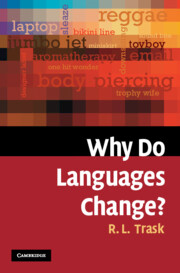Book contents
- Frontmatter
- Contents
- List of figures and tables
- A few words before we start
- Acknowledgements
- 1 How do languages change?
- 2 Why are languages always changing?
- 3 Where do words come from?
- 4 Skunk-Leek – my kind of town: what's in a name?
- 5 Where does English come from?
- 6 Why is American English different from British English?
- 7 Why is English spelling so eccentric?
- 8 Which is the oldest language?
- Some final thoughts
- Further reading
- Index
1 - How do languages change?
Published online by Cambridge University Press: 05 June 2012
- Frontmatter
- Contents
- List of figures and tables
- A few words before we start
- Acknowledgements
- 1 How do languages change?
- 2 Why are languages always changing?
- 3 Where do words come from?
- 4 Skunk-Leek – my kind of town: what's in a name?
- 5 Where does English come from?
- 6 Why is American English different from British English?
- 7 Why is English spelling so eccentric?
- 8 Which is the oldest language?
- Some final thoughts
- Further reading
- Index
Summary
All languages change
My grandparents didn't talk the way I talk. For example, my father's mother never used the words at the end. Instead, she always said at the last end: ‘at the last end of the movie’, ‘at the last end of the game’, and so on. My father said the same. But I have never said this, and even in childhood I considered it strange.
You too have very likely noticed that your parents or your grandparents speak or spoke a little differently from you. And, if you have children or grandchildren, you have almost certainly heard them saying things that you would never say. Everywhere we look, we find differences in speech between the generations.
Each generation speaks a little differently because our language is always changing. And not just our language: every language is always changing. There is no such thing as a living language that fails to change. This is a piece of truth on which you can rely absolutely.
There's a widespread legend about a remarkable village, in the Appalachians or in Derbyshire or somewhere distant from London and New York, where the locals still speak pure and unchanged Elizabethan English. It doesn't exist. Nobody on earth has spoken Elizabethan English since the time of Queen Elizabeth I, around 400 years ago. There is nobody alive today who speaks English the way William Shakespeare spoke it, or the way Samuel Johnson spoke it, or the way Abraham Lincoln spoke it, or the way Queen Victoria spoke it.
- Type
- Chapter
- Information
- Why Do Languages Change? , pp. 1 - 18Publisher: Cambridge University PressPrint publication year: 2009



